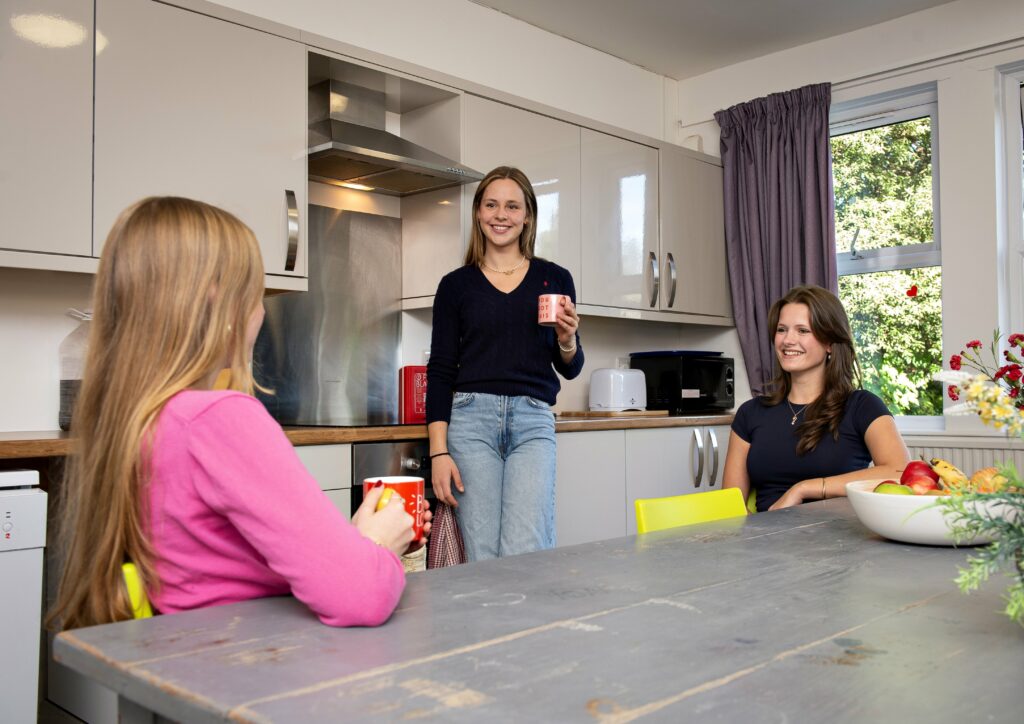Creating a home-from-home environment is top of the agenda for Independent Boarding Schools. Queen’s College, Taunton is no different with Head of Boarding, Carla Shearman a shining light for excellent practise when creating a warm and inclusive boarding school feel.
In 2023, Fortune, in co-operation with Statista, identified Queen’s College, Taunton as a “World Leading Boarding School”, which is a testament to Carla’s team of highly qualified, experienced and nurturing boarding staff and excellent facilities.
Carla has shared her eight key considerations for creating an outstanding boarding school environment.
1) Set the Tone with an Excellent Boarding Induction
Induction plays a vital role in helping boarding students at Queen’s College transition smoothly into their new environment. Our experience at Queen’s College, Taunton shows the needs of students vary significantly depending on their background, country of origin, language ability, and prior experiences. As Dr. T. Hawkes notes, “The cultural background of international students and the influence of peers can all have an important bearing on a personal situation.” In boarding schools, staff act in loco parentis, taking on the responsibility to tailor their care and guidance to meet each student’s unique needs. A comprehensive induction programme helps students integrate into the academic, social, and residential life here at Queen’s College, Taunton.
2) Don’t Lose Sight of Life Beyond Boarding School
Parents often select Queen’s College, our Independent Boarding School in Taunton, not only for academic excellence but also to ensure that their children are prepared for life beyond school. This concept, referred to as “onward orientation,” aims to equip students for a cosmopolitan life in a multicultural society, wherever that may be. According to the British Council report The International Student Perspective, parents are looking for schools that prepare their children for future success in a modern, globalised world. An effective induction programme supports this goal by helping students adapt to a new environment and culture, while also encouraging personal growth and independence.
3) Pre-Arrival Support: The Foundation of a Smooth Transition in to Boarding School
Induction begins long before students arrive at the school. A proactive approach to pre-arrival support can significantly ease a student’s transition into boarding life here at Queen’s College. Frequently, our new boarders take the opportunity to participate in a taster session at the boarding house, but there are often logistical challenges, especially for international students. As a solution, schools should embrace technology, using video calls and virtual meetings to introduce students to houseparents and fellow students before they arrive.
“For schools to be successful in taking on responsibility for international students, much needs to be done before the student even arrives,” writes Greenfield. Establishing a rapport through early contact helps Queen’s College staff identify potential issues, such as language barriers or cultural differences, and enables the school to alert relevant departments, such as English as an Additional Language (EAL). This process also involves working closely with guardians to ensure that important information is passed on to students and their families.
4) The Role of Guardians in the Boarding Induction Process
The partnership between Queen’s College and the guardians is essential for a successful induction. As outlined in the Boarding Schools’ Association (BSA) guidelines, “The school remains responsible for safeguarding and promoting pupil welfare and should treat the guardian as part of its own provision.” Ammy Davies-Potter, Director of Guardianship and Inclusion at the BSA, emphasises the importance of smooth communication between schools and guardians. There is a danger that when information fails to flow effectively, students could fall through the cracks, particularly when there is a language barrier or cultural differences to navigate.
I had the opportunity to speak with Eve Leung, Director at Elite Anglo-Chinese Services, who shared insights on how to make the transition period smoother for students. She recommended holding a Zoom meeting with students and their families before they arrive, as this helps alleviate some of the anxieties they may have. Additionally, she suggested using pre-recorded videos for induction purposes, providing a less overwhelming way for students to familiarise themselves with the school and its rules. These videos can complement written materials, such as handbooks, which can sometimes be overwhelming for international families.
5) Managing Homesickness and Emotional Wellbeing
Homesickness is a common issue for boarding students, especially for those who are living away from home for the first time. Research by Adams & Adams indicates that girls, in particular, tend to experience more homesickness and emotional distress than boys. Homesickness is a normal part of the transition process, but if left unaddressed, it can impede a student’s ability to form positive relationships and fully integrate into the school community.
One important strategy we employ for managing homesickness is encouraging students to personalise their living spaces with items from home. This small act can help create a sense of belonging and comfort in an unfamiliar environment. Additionally, boarding staff should regularly monitor new students and discuss any signs of homesickness or emotional distress during the early weeks of the term. Early intervention can prevent prolonged feelings of isolation and sadness.
Emotional wellbeing is a critical component of a student’s overall success, both academically and socially. According to J. Cox, “Young people with good mental health will be more resilient, helping them cope with life’s stressors, including academic pressure and social challenges.” Queen’s College prioritises mental health in our induction programmes. Schools can promote wellbeing by fostering self-esteem and providing students with strategies for coping with stress and anxiety. Regular one-to-one check-ins between houseparents and new students are essential for identifying any emotional needs or concerns early on.
6) The Role of Peer Support in Induction
We have found that incorporating peer support into the induction process is another effective way to help new students adjust. Current students who have already been through the experience can provide valuable insights and advice to newcomers. Many students and parents appreciate receiving information from a peer before arrival, as it offers a more relatable perspective. Peer support can also help alleviate some of the anxieties new students may have about making friends or fitting in socially.
Julie Evans from Cambridge Guardian Angels stresses the importance of introducing guardianship to parents early in the process, so that it is seen as a necessary partnership rather than an additional cost. She also emphasises the value of peer support, recommending that schools establish connections between new students and current students before the term begins.We frequently hold virtual meet-ups or email exchanges, allowing new students to ask questions and receive advice from someone who has already experienced the transition.
7) Cultural Adaptation and the Role of Boarding Staff
For many international students, adjusting to a new culture can be challenging. The concept of “Third Culture Kids” (Sears) refers to globally mobile children who often move between different countries and cultures, which can lead to feelings of culture shock. Pollock and Van Reken describe the stages of transition that these students experience: involvement, leaving, transition, entering, and reinvolvement. Boarding staff must be prepared to support students through these stages, helping them acclimatise not only to a new school but also to a new culture.
Queen’s College staff are trained to be sensitive to the cultural differences students may face and provide guidance on navigating these challenges. This may involve explaining different social norms, laws, and customs, which could differ significantly from those in the student’s home country. Collaboration with a range of support services, such as the Police Community Support Officer (PCSO), can also help students understand their new environment better.
8) Building Positive Relationships: A Key to Success
The relationships that students form during their time in boarding school are crucial to their overall wellbeing. “Positive relationships promote well-being within children and young adults,” notes Roger Catchpole from YoungMinds. Strong connections with peers, staff, and guardians provide students with a support network that helps them feel safe and valued. This, in turn, fosters self-confidence and resilience, which are essential for personal growth.
In addition to peer relationships, the bond between students and staff is equally important. Staff must model positive behaviour, as young people often imitate the behaviour they see in the adults around them. “Young people will adopt the behaviour modelled to them by the adults in their lives,” writes J. Cox. By creating a respectful and caring environment, staff can help students develop important life skills such as independence, responsibility, and empathy.
Conclusion
A well-structured induction programme is essential for helping students, particularly those in boarding schools, transition smoothly into their new environment. From pre-arrival contact to emotional support and peer connections, each element of the induction process plays a vital role in ensuring students feel welcomed, supported, and prepared for the challenges ahead. By addressing the unique needs of each student, schools can create a positive and nurturing environment that promotes academic success, personal growth, and emotional wellbeing.
I’d like to invite you to watch our short film on Boarding at Queen’s and if you have any further questions or would like to arrange an appointment with our admissions team. Please contact them at admissions@queenscollege.org.uk or telephone +44 (0)1823 340830.
References:
- British Council report, The International Student Perspective.
- Dr. T. Hawkes, Cultural Background of International Students.
- Greenfield, Successful Induction for International Students.
- Adams & Adams, Research on Homesickness
- J. Cox, Self-Esteem and Risky Behaviours in Youth.










